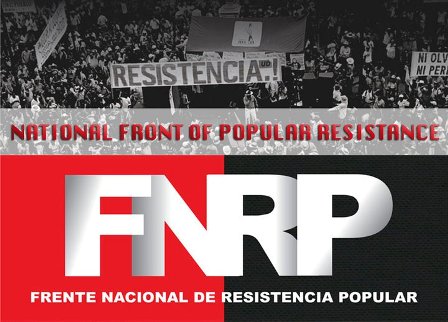
Tegucigalpa, 11 July 2010, The National Front of Popular Resistance (FNRP), after a long and honest democratic discussion in Tocoa Colon, with the 56 national delegates, in an organizational First Assembly, elected a provisional coordinating body, which will act until December 2010.
As well as naming the president in exile, Manuel Zelaya as President of the Executive Committee, the agreements include the decision “not to participate further in elections, ‘Honduras style’, that strengthen the two party system and contribute to the enrichment of the same elite that was the agency of the coup.
COPRUM (Teachers’ Union Professional Society) assessed the event as “full of the natural contradictions that would be normal for human beings who have lived most of their lives in silence and voiceless”.
“What is the problem, if we shout and squabble? It is preferable to have the disorder of a democracy where everyone speaks, and everyone complains, than an oligarchic democracy where people are punished for dissent” said the assessment of the editorial.
It stated, in the same style; “If there is no debate in the Resistance, it dies, and with it, dies the great project of national transformation”.
The validity of the provisional coordinating body will be extended from September to December, when the National Coordinating body itself will be established.
A Commission organized before the 16th of July will do a study as to whether the number of delegates be increased to 56, the number of delegates who will be part of the permanent coordinating body.
The issue of the Constituent Assembly is becoming a theme central to the Resistance movement and a procedure will be developed for it to be convened. The sovereign declaration for the Constituent Assembly is included, together with the themes of organization, formation and mobilization adopted previously.
Carlos H. Reyes, leading member of the FNRP was understood that there had been “accusations, rejections and complaints” but this is important “because there is no point in gaining a good Constitution (hopefully the Constituent Assembly’s), if there is no people capable of organising and defending it.”
He noted the “positive value of the discussion and the thoughtful way in which decisions were made” and explained, “people understood that there are internal problems regarding ways in which we can improve the leadership.”
Juan Barahona pointed out that in the preparation meeting of the Assembly “there was a lot of debate, the exercise of respect and unity that strengthens democracy, and there was respectful discussion, as a rule.”
Some participants dissatisfied with the resulting representation criticised “people who had status that they hadn’t earned.”
Others complained that there were those who seemed “like owners who have attacked the Resistance, acting with impositions and personal interests displacing the Resistance”.
The Resistance is made up of social and political organizations; and hundreds of thousands of individual members from neighborhoods and communities, without belonging to any other organization or political party other than the Front.
Translated by Fry Warwick